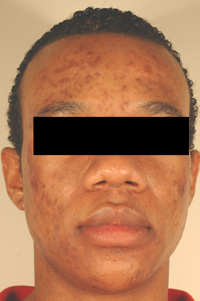Do you know your skin type? It’s okay if not as most of us don’t, but if you’re considering laser treatments, it’s a very important question. Let’s ask it another way: do you burn when you’re in the sun? If you answered yes, then you most likely have type I or type II skin. If you’re answer was no, then you may be a type III, IV, V, or VI. Skin type refers to the color of a person’s skin, how dark or light it is. This generally reflects their ethnic background. There are six different skin types from type I to type VI. The lower the number, the lighter the skin and the higher, the darker.

 While you may not care much about what your skin type is, we care a lot. In fact, a person’s skin type might just be the most important piece of information for us to know when they’re seeking laser treatments.
While you may not care much about what your skin type is, we care a lot. In fact, a person’s skin type might just be the most important piece of information for us to know when they’re seeking laser treatments.
From a laser dermatology perspective, it’s not enough just to look at the color of a person’s skin. We need to know how their skin behaves in the sun. Believe it or not, there are people with darker, olive skin who will burn badly on their first day of sun exposure!
Lasers use specific wavelengths of light to target very specific components of the skin (melanin, hemoglobin or water). And some wavelengths are not appropriate for every skin type. Generally, shorter wavelengths are less safe for darker/higher skin types. Longer wavelength ones tend to produce the desired, intended effect without risk of unwanted side effects. Why? People with darker skin who tan very easily have more melanin, and this tends to compete for the laser light with the intended target (hair, spots, etc).
Recent advances in laser technology have given us more laser than ever to choose from. It’s our job to understand both the condition we are treating and your skin type to pick the safest, most effective device to get the job done.
This is just one more reason why it is so important to research your laser practice/practitioner before you have your first treatment. If the practice doesn’t clearly understand the specifics of laser physics and skin type, then they can’t choose the safest laser for your skin. And a practice that only has one or two different lasers but claims to be able to treat all skin types should worry you.
There are many safe and effective laser treatment options if you have a dark skin. Just make sure whomever you choose has the proper laser knowledge and technology to treat your skin.

